Content
- Defining guilt feelings in psychology
- How the feeling of guilt arises, the mechanism of formation
- Why does a person feel guilty
- Embarrassment, shame, and guilt. How to distinguish feelings?
- How pathological guilt is expressed: visible and hidden signs
- Why Get Rid of Guilt
- Ways to Deal with Guilt
- The psychology of emotions
- Gestalt psychologist
- Public remorse method
- Working with introjects
- To apologize
- Imaginary moral judgment
- Confrontation with the accuser
- Positive approach
- Affirmations
- Test therapy
- How to get rid of the feeling of guilt?
- After alcohol
- In a teenager
- After the betrayal
- In front of the mother
- Before the child
- Before the deceased
- After divorce
- Guilt Videos
In the statistics of psychological counseling, questions about how to smooth out feelings of guilt occupy a significant place. This is the emotion that allows a person to be more sensitive to others, control your actions so as not to harm loved ones and not so people. But sometimes this feeling can significantly poison your own life.
Defining guilt feelings in psychology
Guilt in psychology is a social feeling that arises as a result of the violation of any mandatory actions established by oneself, parents or the surrounding social environment. Guilt is not always viewed as a negative attitude.
Understanding that the individual's conscious or unconscious actions have harmed someone encourages the person to apologize and avoid bad deeds. As a result, the personality goes through certain degrees of self-development, which bring it closer to the ideal of humanity and soulfulness. Such a sense of guilt, which correlates with a sense of responsibility, is considered constructive in the development of a personality.
A depressing feeling is considered in a completely different way, which turns into a chronic one, interferes with building harmonious relationships and accepting oneself as a mature person.
How the feeling of guilt arises, the mechanism of formation
Various psychological schools still do not come to a consensus when the moment of manifestation of guilt comes. Some psychoanalysts, for example, Melanie Klein, believe that a baby several months old can feel guilty towards the mother. Opinions are unanimous in one thing - this emotion is not innate, it is formed already in the first years of a child's life.
Nurturing guilt isn't always a negative thing. We can say that this is one of the elements of upbringing, instilling in the child the proper behavior in society.
But in cases where the behavior of the parents brings stress and suffering to the child, he finds himself at a crossroads: who is right - he or the parents. The high authority of parents always wins, children take punishment as a given to the fact that they themselves are to blame for their problems. The child is not able to assess in a balanced way what depends on him and what is not in his power.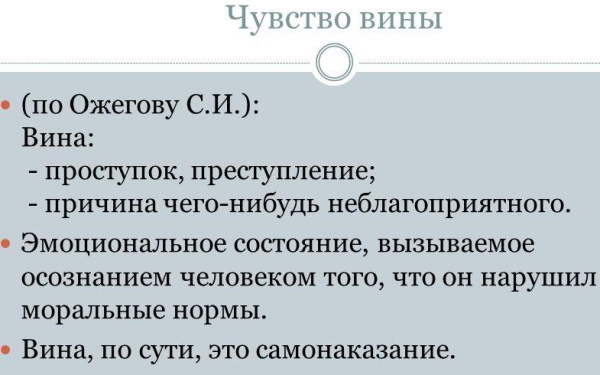
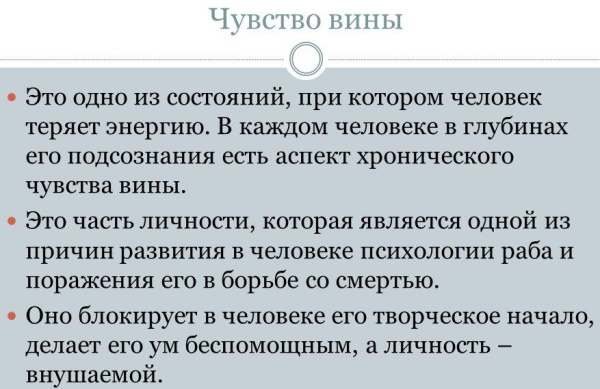
Examples of situations that lead to the formation of pathological guilt:
| Installation | Manifestation in adulthood |
| Behavior Improvement Reproaches: "All because of you (late, mom is sick, the house is a mess)" |
For all troubles in the family and in the team, a person, first of all, will blame himself. |
| Categorical judgments as it should be | In the event of a desire that contradicts the learned attitudes, a person has an internal conflict, and a feeling of guilt for violating family values. |
| A ban on the manifestation of negative emotions ("only bad people get angry and cry") | Any situation that leads to the manifestation of anger, rejection, causes self-accusation. Emotion in this case is directed inside the person, which leads to self-destruction and self-flagellation. |
Why does a person feel guilty
Guilt in psychology is a feeling that belongs to a part of the mental life of a normal healthy person. Some mentally ill people who have impaired perception of the people around them as living beings are deprived of this emotion. Internal guilt for harming another person is an indicator of decency and good upbringing.
The problem manifests itself in the case when a feeling of guilt haunts a person who has not done anything wrong.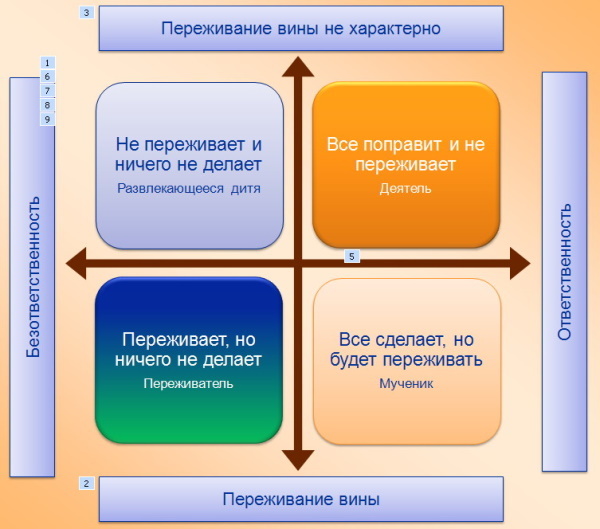
For example, very often people who survived in a car accident feel guilty before the dead, objectively speaking, they are not guilty of what happened. A mother who leaves the baby with a nanny and runs about her business will punish herself for being a bad mother, although her job is very important for the family. Such a deceptive self-image is always accompanied by stress and a constant desire to atone for their perceived guilt.
In a similar way, a protective reaction of the psyche manifests itself, in the case when a person cannot admit his powerlessness, the inability to change the situation. A feeling learned in childhood and consolidated subconsciously forces a person to blame himself for all the troubles that occur around him.
Feeling over time becomes part of the adult lifestyle. He constantly feels unhappy, does not allow himself to straighten his shoulders and breathe deeply. Chronic guilt is destructive for the psyche. It gives rise to such accompanying emotions as envy, hatred, resentment. People who consider themselves “guilty without guilt” constantly regret unfulfilled dreams, not taking any steps to realize them.
Embarrassment, shame, and guilt. How to distinguish feelings?
The manifestation of such emotions as shame, embarrassment is often mistaken for guilt, although they have completely different origins.
- Shame is a feeling that arises from the fear of being judged by other people, the subsequent rejection from society. Shame leads to the realization of their inferiority, makes them want to hide or run away.
- Embarrassment occurs when a person finds themselves in an unexpected or awkward situation and feels they don't look the way they would like.
- Guilt manifests itself at the moment when a person violates a rule established for himself and condemns himself for it.
How pathological guilt is expressed: visible and hidden signs
Feelings of guilt can manifest itself in different individuals, in addition to the usual feeling of guilt:
- Excessive apologies for any reason.
- A chronic feeling of inappropriateness, of non-compliance with far-fetched or imposed ideals, makes a person feel confident that he does not deserve to be happy. A person with such an attitude continues to "pull a cart" of hated duties, to live in an unhappy marriage.
- The opposite feeling, which arises against the background of a feeling of guilt, is aggression directed at oneself or at a person, which allegedly interferes with conforming to the folded ideal.
- Feelings of guilt also find a way out in excessive anxiety for any reason and without it.
Why Get Rid of Guilt
Guilt in psychology is a feeling that significantly reduces the resource of a person's vital energy. Living with a constant sense of guilt sooner or later leads to destruction.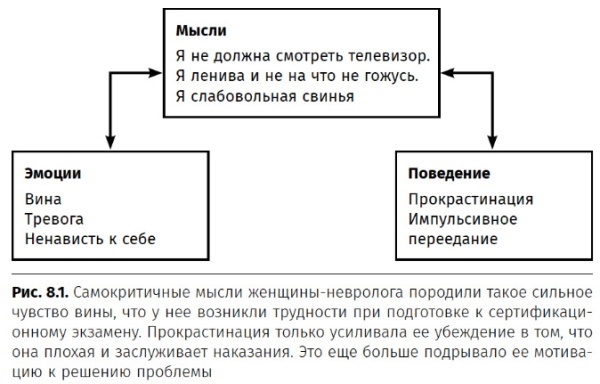
The main problems that arise on this basis:
- nervous breakdowns;
- health problems;
- alcoholism;
- problems with starting a family;
- difficulties with communication in a team;
- susceptibility to manipulation.
According to the famous psychologist Sigmund Freud, guilt is the basis of human conscience and morality. It is very important to strive to understand where there is true wine, and where is contrived.
Ways to Deal with Guilt
Fortunately, guilt is an emotion that can be corrected. The beginning of liberation is the awareness of real feelings. In most cases, a person who decides to change his thinking is able to cope with the negativity himself, sometimes the help of specialists or thematic literature is needed.
In psychology, there are several techniques that help to direct the feeling of guilt in a positive direction.
The psychology of emotions
Rules of communication and ways to manage their emotions are needed by every person to build normal relations in society. Emotions, as a regulator of human behavior, manifested themselves in the process of evolution at an earlier stage than the mind. Under their influence, there is a significant release of energy and the mobilization of such forces in the body, which cannot be caused by any means of reasonable influence.
The ability to manage negative emotions is not given to everyone. Moreover, the constant suppression of negative feelings, so as not to cause condemnation, leads to an even greater release of them. The modern method of psychological self-regulation is based not on rational control over emotions, but on completely getting rid of them, achieving maximum serenity.
Reflection and analysis of the circumstances are very important for awareness. To get rid of feelings of guilt, it is necessary to understand that experiencing negative emotions is a normal phenomenon that is characteristic of all living people.
Gestalt psychologist
Gestalt therapy is a relatively new branch of psychology aimed at correcting desires, forms of behavior, and interests of the client. Not all, but only that part of them that interferes with the satisfaction of significant human needs. The work is carried out without excessive theorizing, it differs little from ordinary interpersonal contact.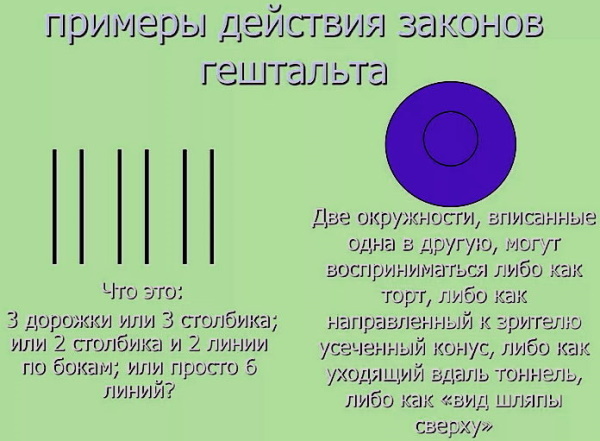
Features of the work of a gestalt psychologist:
- The ability to simply listen to the person who asked for help, without comments or evaluation.
- Sincere interest in the details of the client's life, his thoughts and judgments.
- Close observation of the actions of the interlocutor at the moment.
- Building a conversation as a dialogue with the delivery of your own inner thoughts and feelings.
- Consensus experiments that help a person realize their true needs, see clearly how they are blocked by their own actions.
Public remorse method
A person who is ashamed of his act, carries his emotions within himself, does not always correctly assess his act and its impact on others. One of the methods of Gestalt psychology offers a frank story to a friend, or a group of people who will listen with understanding and support. When a person speaks publicly about his deed, the foundation of inner fear collapses.
Working with introjects
A psychological technique that should help in overcoming the attitudes laid down in the early years of life. To work on yourself, you need to frankly state on paper all the requirements for yourself and the obligations you have assumed in relation to others. The resulting list requires rethinking and reevaluation towards the fact that not all things required of oneself are really important and necessary.
To apologize
In psychology, there are a number of ways to get rid of guilt that are suitable for independent work. The simplest, but no less effective way is just to talk to the person in front of whom there was a feeling of guilt, to ask him for forgiveness. All people make mistakes, this burden must be removed from oneself. Even if the addressee does not accept remorse, this will already remain a matter of his conscience.
Imaginary moral judgment
A person who blames himself for something, mentally condemns his thoughts and actions. As in the case of this trial, the guilty party must have a lawyer. You also need to mentally find an excuse for your actions for yourself. Perhaps, the arguments expressed in this way will turn out to be weighty and will be able to overcome the arguments of the prosecution.
Confrontation with the accuser
In the event that not entirely objective accusations are presented by another person, you do not need to accept them indisputably, even if they come from an authoritative person. It is imperative that you initially apologize for any inconvenience caused. If this did not resolve the conflict, then you should show understanding to the interlocutor, but at the same time firmly and calmly express your opinion.  To reproach yourself for creating conflict is to allow your conscience to be manipulated.
To reproach yourself for creating conflict is to allow your conscience to be manipulated.
Positive approach
In any case, a positive can be derived from personal guilt. It should be remembered that healthy people who never experience such emotions do not exist. It is useless to regret what has been done (or not done on time) - time does not count in the opposite direction. Feelings of guilt are a great way to reflect on and adjust your overall actions. He who does not live is not mistaken.
Affirmations
This is the name of positive statements that, with repeated repetition, can replace the negative attitudes that were previously fixed in consciousness. There are general affirmations, aimed at improving life in general, and special ones, for achieving a specific goal.
Test therapy
Guilt in psychology is an internal state of imbalance that is well diagnosed through psycho-testing. Modern methods of creating psychological tests make it possible, by examining multiple elements, to determine the true state of a person, attitudes hidden in the subconscious.
You can take self-knowledge tests yourself online and completely free of charge. Results and short explanations are given immediately after the end of the test. For a more complete coverage of the results and their correct interpretation, it is better to contact a center for psychological assistance to a specialist.
How to get rid of the feeling of guilt?
Each situation that causes a feeling of guilt carries a certain lesson for a person, it is important to draw the right conclusions from it.
After alcohol
The feeling of guilt after excessive alcohol consumption is manifested by hangover depression, which occurs in a significant proportion of people. The reason for this condition is a significant decrease in the hormone of happiness - serotonin. Hangover guilt even has a separate name - shamover, more often people with low self-esteem, who have an imperfection complex, are prone to it.
To successfully survive this period, psychologists advise:
- Don't get drunk.
- Spend time in the most comfortable environment.
- Talk to a close, understanding person.
- Breathing exercises help to get rid of bad thoughts: counting to 4 - inhale, the same amount - exhale.
- Dishes containing nuts, meat, cheese will help to survive physical and mental discomfort.
In a teenager
The adolescent period is the most difficult in the formation of a person. Unstable psyche, changes in the physical body, hormonal changes become a common cause of teenage depression. Young people tend to take the blame for the unsettled life around them. This is sometimes manifested by increased aggressiveness.
To help your child cope with their feelings, you need to:
- In the discussion of incorrect actions, it is the actions, and not the personality, to be analyzed.
- Separate your feelings ("I'm ashamed of you") from the actions of the teenager.
- Not discussing bad deeds in front of others.
- You shouldn't be forced to ask for forgiveness, this leads to the habit of formal apologies later on. Better to discuss how to get out of an unpleasant situation.
- It is important to teach the child to understand the relationship between his actions and the result.
After the betrayal
A person who has betrayed his partner invariably suffers from feelings of guilt.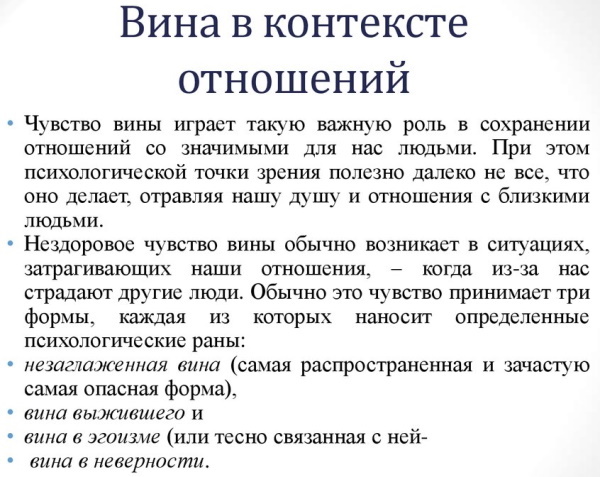
What will help him restore peace of mind:
- Support of a loved one, to whom you can tell everything and consult. Sometimes it can be an anonymous psychological group, a psychotherapist, or a spiritual guide for a believer.
- Forgiving yourself. You need to realize that any person is not perfect, he can succumb to any temptations.
- The desire to fix everything. The feeling of guilt disappears if the unpleasant situation does not have a continuation or repetition.
In front of the mother
In relationships with parents, the main thing is to find the right balance between the necessary attention to those closest to you and the heavy burden of responsibility that oppresses and oppresses. Most people feel guilty about their mother or both parents. It arises due to the great psychological dependence between mother and child, which remains for life. Growing up children should define their personal boundaries, recognize their right to an independent, separate life.
Helping parents with pressing problems that they cannot solve on their own is one thing, but succumbing to manipulation and constantly fulfilling someone else's will against their desires is already unacceptable. Children, regardless of age, always remain children for the mother. It is hard for her to realize the minute when they are already becoming quite independent. A frank conversation can help in communication.
Before the child
Feelings of guilt towards a child are just as common as feelings of guilt towards their parents. A working mother constantly feels guilty for the lack of attention to children.
There are certain techniques that allow you to tune yourself into a positive:
- Two sides. This technique requires a pen and a sheet of paper divided into 2 columns. In the first, everything that is done for the child is recorded, in the second - what is vital, but not done. A real picture appears, which helps to correct what is needed and to accept that not everything is so bad.
- This sheet with records should be shown to friends from different categories (it is not necessary to announce who is being discussed), and ask them to express their opinion about such a mother.
- You can ask for help from close people who, in a friendly conversation with the child, will find out what he values most in his parents, and what oppresses him.
Before the deceased
Almost everyone experiences a feeling of guilt before a loved one who has gone into oblivion. It manifests itself in different ways, most reproach themselves for a lack of attention to a person, for some actions that can no longer be corrected.
The easiest way in these cases is to be restored to a believer. Relief comes after confession, a frank conversation with a priest. It often happens that many come to faith just after the loss of a loved one. The tendency in society that you cannot suffer for a long time makes you feel even more guilty and drive your feelings deeper so as not to irritate others.
- Grief must be accepted and experienced. This takes time, which does not heal, but puts everything in its place.
- Crying and talking about the deceased is important - it relieves the soul.
- The fact that a person is no longer alive does not mean that he is forgotten. The memory will keep the best memories of the time spent together.
- Relief after the death of a seriously ill person is a normal emotion to release tension, you do not need to take the blame on yourself.
- It is important to observe all funeral rituals.
After divorce
The thought that maybe it was necessary to continue the relationship for the sake of the children is the main reason for the emergence of feelings of guilt.
To understand how true these self-reproaches are, some psychological techniques will help:
- The first step is to determine what specifically triggers the feeling of guilt.
- If guilt really exists, you should admit it to your former half and ask for forgiveness.
- If it turns out that there is no objective reason, you need to change your personal attitude to this issue. Sometimes self-accusations are so strong that the help of a psychotherapist becomes necessary.
- Each person, after parting, experiences sadness about the past period. This is a normal occurrence that wears off over time and has nothing to do with guilt.
- It should be determined seriously whether it was better for children in a family with parents who quarrel, or it is still better apart, but peacefully.
- Perhaps there is depression or fear of loneliness behind the feeling of guilt. Special literature or the consultation of a psychotherapist will help in this.
In psychology, all the techniques to alleviate the feeling of guilt are reduced to the fact that a person needs to recognize the imperfection of the world. No person is perfect, not immune to mistakes. It is important not to carry the blame within yourself, but to express it to someone who will listen without bias. This could be a friend, a therapist, or a priest. For some, their own conscience becomes such an assistant.
Guilt Videos
How to get rid of deep feelings of guilt:



